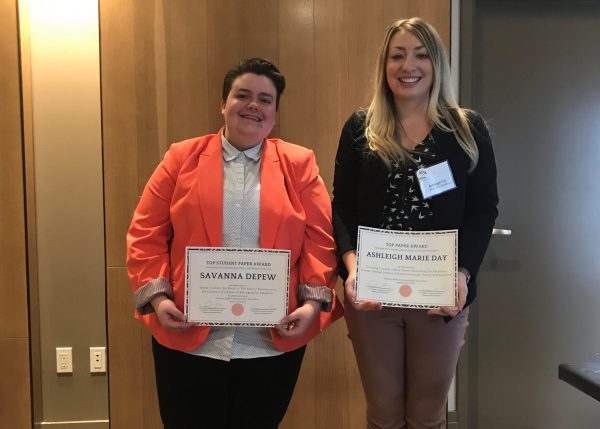Graduate student Savanna Depew, was awarded Top Student Paper by the Western States Communication Association for her submission, “Home is where the Work is: The Role of Businesses in the Creation of a Sense of Belonging for Diasporic Communities.” Depew wrote the paper in Dr. Eric Aoki’s Global Identities class in April of 2018.

Depew uses communication theory surrounding cross-cultural adaptation, belonging, and diasporas to consider ways that private businesses and corporations can help foster a sense of belonging for employees who are members of a diasporic group. Diaspora is a term that refers to the phenomenon of people or communities moving from their home of origin in order to pursue economic or educational opportunities while maintaining a strong relationship to their place of origin.
Depew relates to the topic in that she moved from her home town in Texas to attend Colorado State University for her master’s program. She says that uprooting herself was challenging.
“The move has proven to be a difficult life-altering change that left me with feelings of loneliness, confusion, and loss” said Depew. “But because of this change in my own life, stories of people and communities across the world who have left their country and family of origin have resonated with me and prodded me to start asking questions about how people who are plunged into a new culture can adapt and develop a sense of belonging.”
Depew grew up in a tiny town named The Colony, Texas. She attended the University of North Texas and earned degrees in communication studies and political science. Through her studies at UNT she discovered a passion for learning how identities and power structures are created and how communication shapes that process.
Depew suggests that the process of deliberation could be used as a tool for businesses to use for cultural adaptation. In her paper, she sites that, “wile deliberation is often utilized for solving complex problems, it can also be a way to ease the cultural adaptation process through explicitly naming values and how participants prioritize any identify their values.”
“I think the most important thing that I learned from my move and research for this paper, is that belonging does not develop by happen-stance; it requires concentrated effort to relate to others,” said Depew. “When I started to be open with people around me, relationships and new worlds opened up and I’ve found that sense of belonging at CSU.”